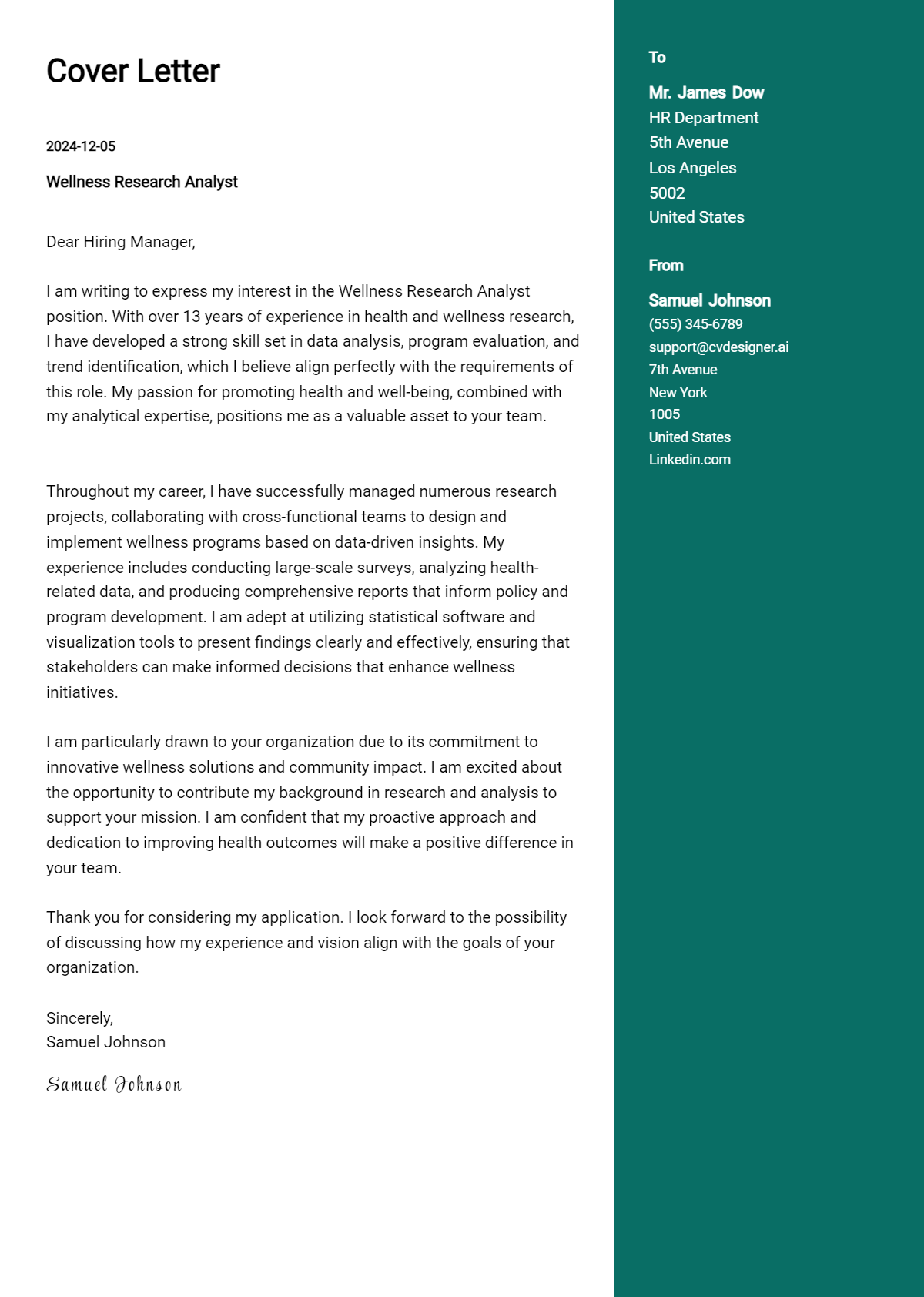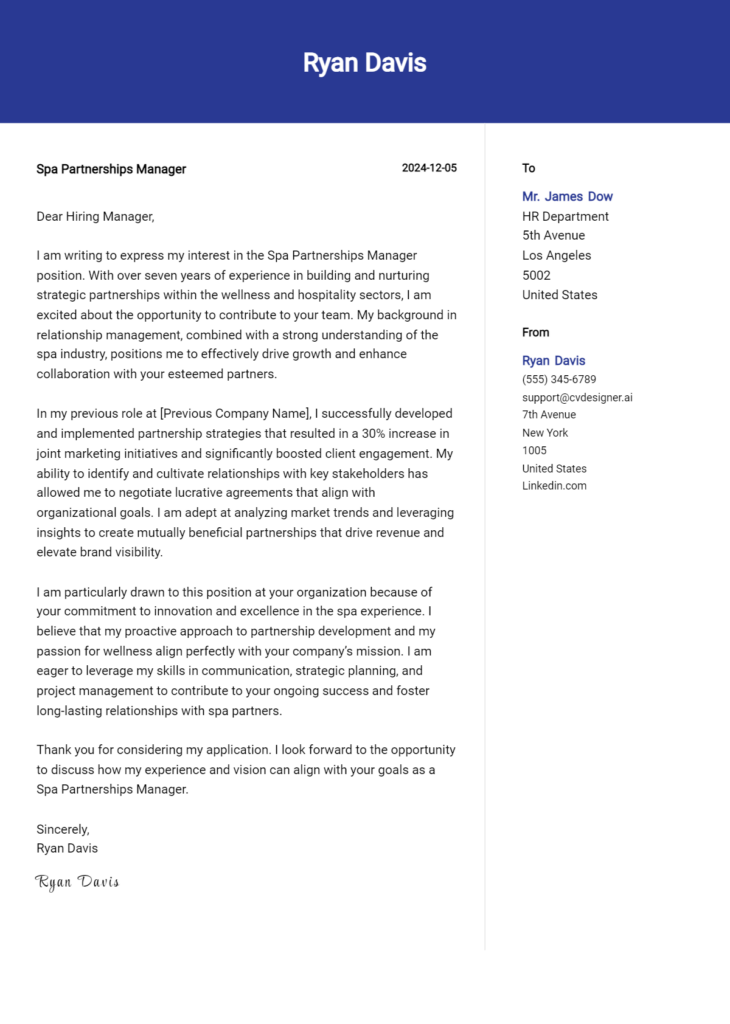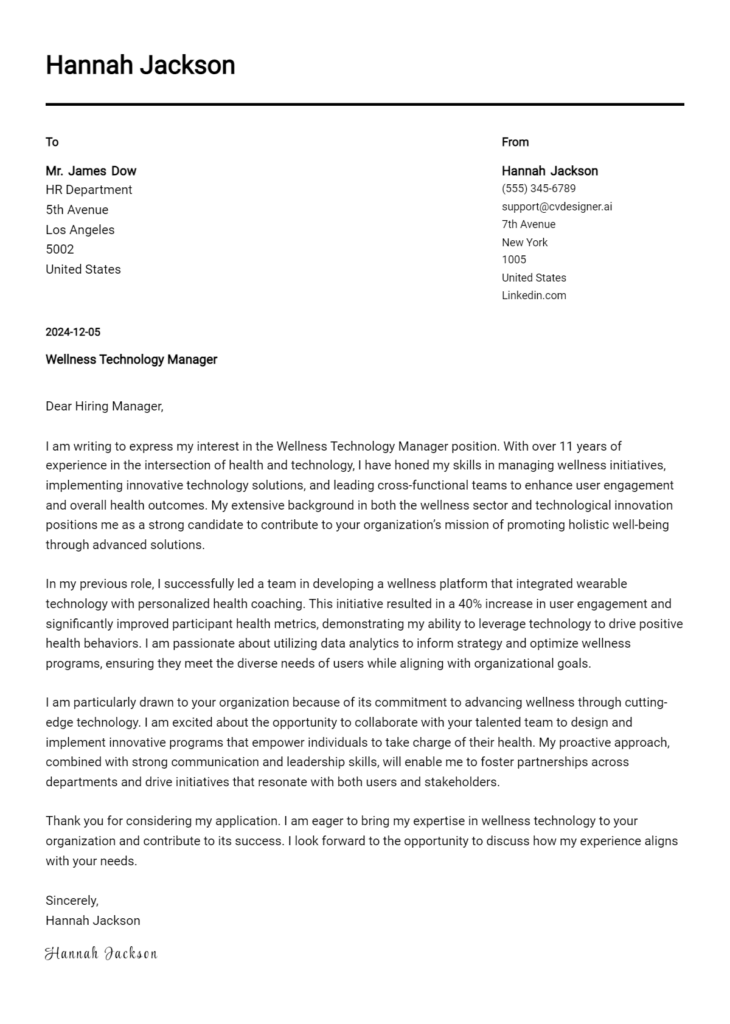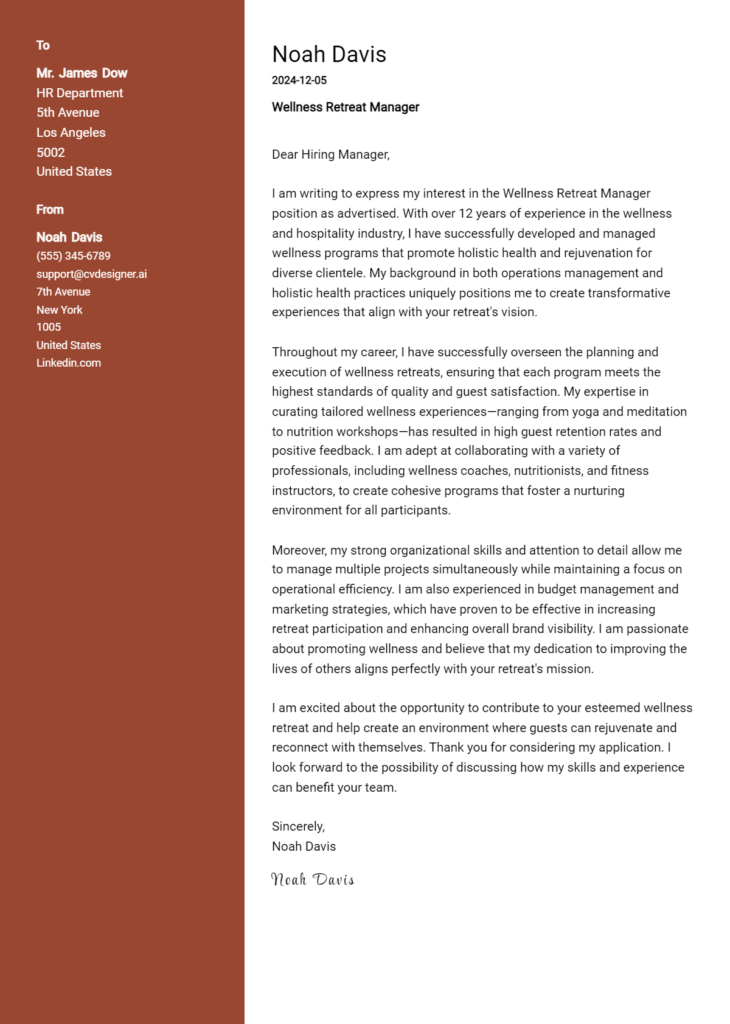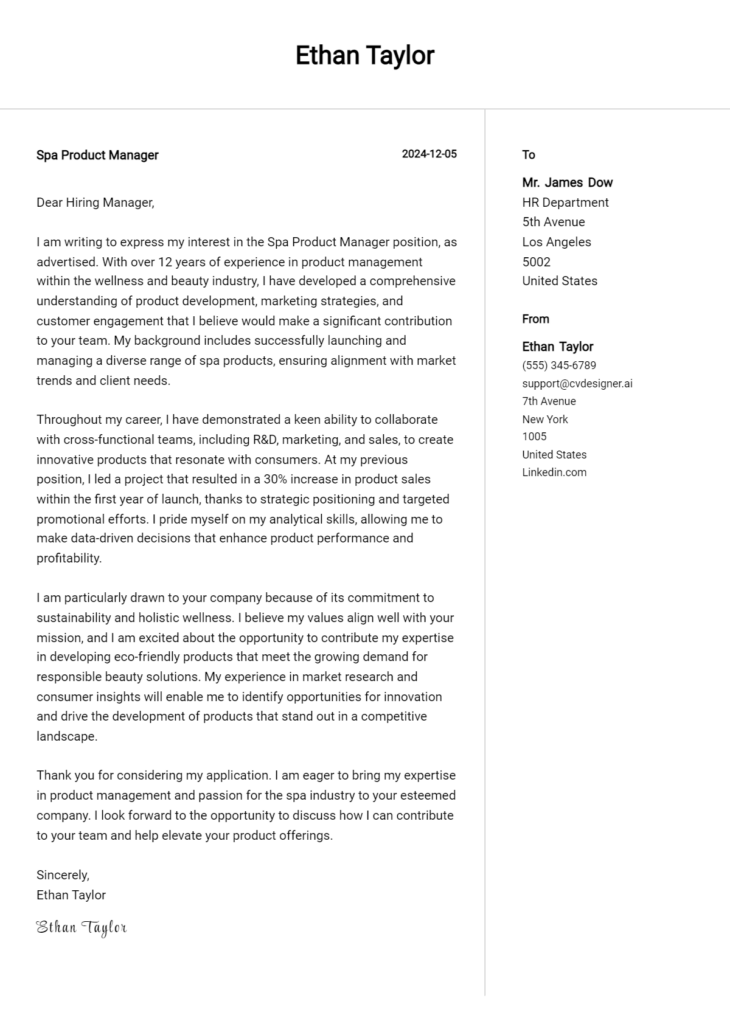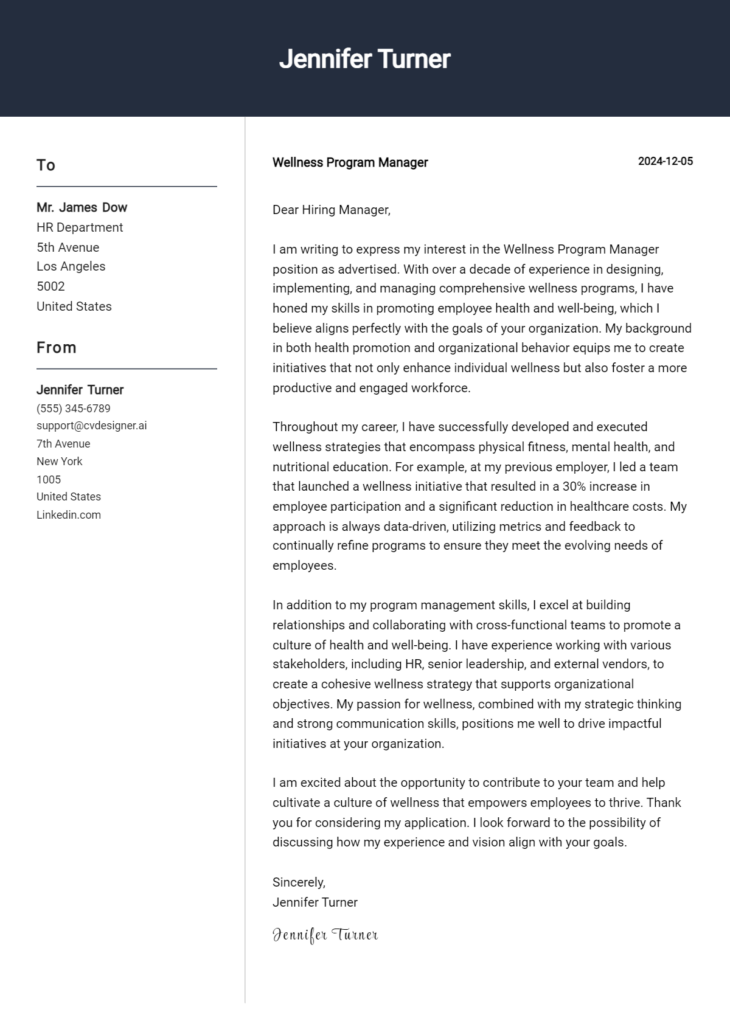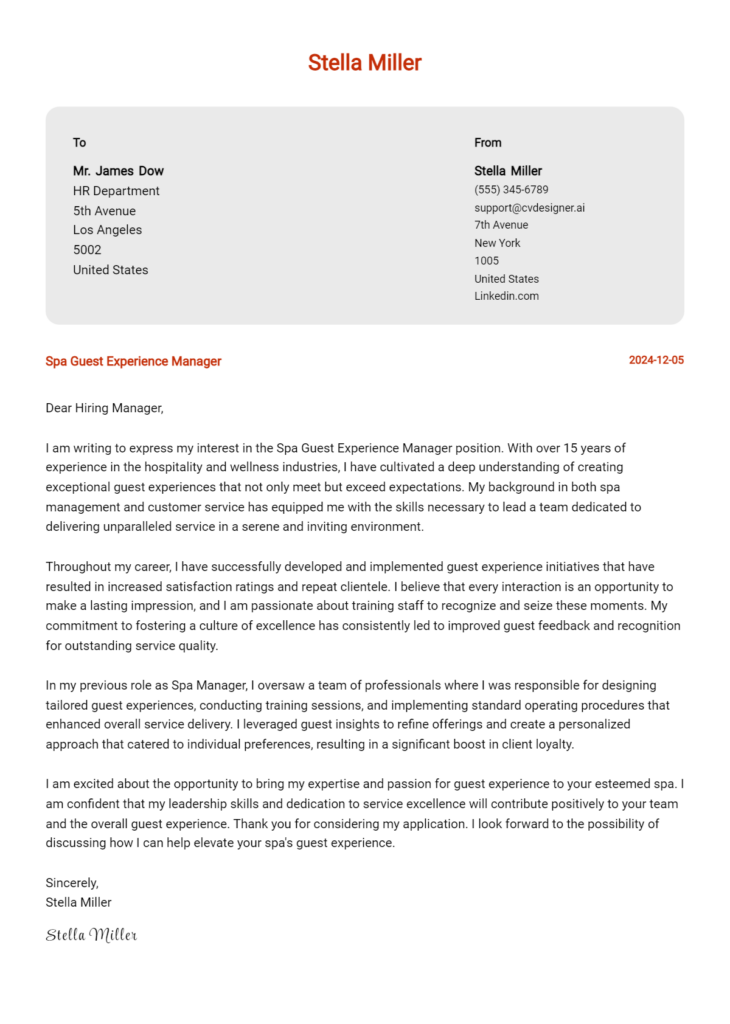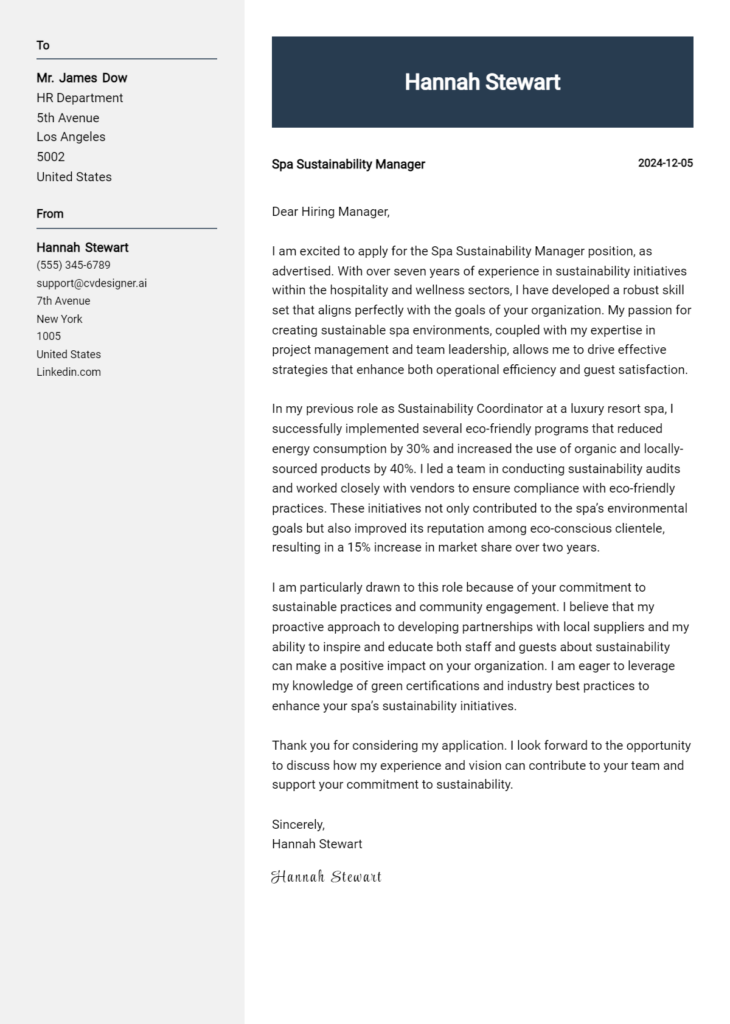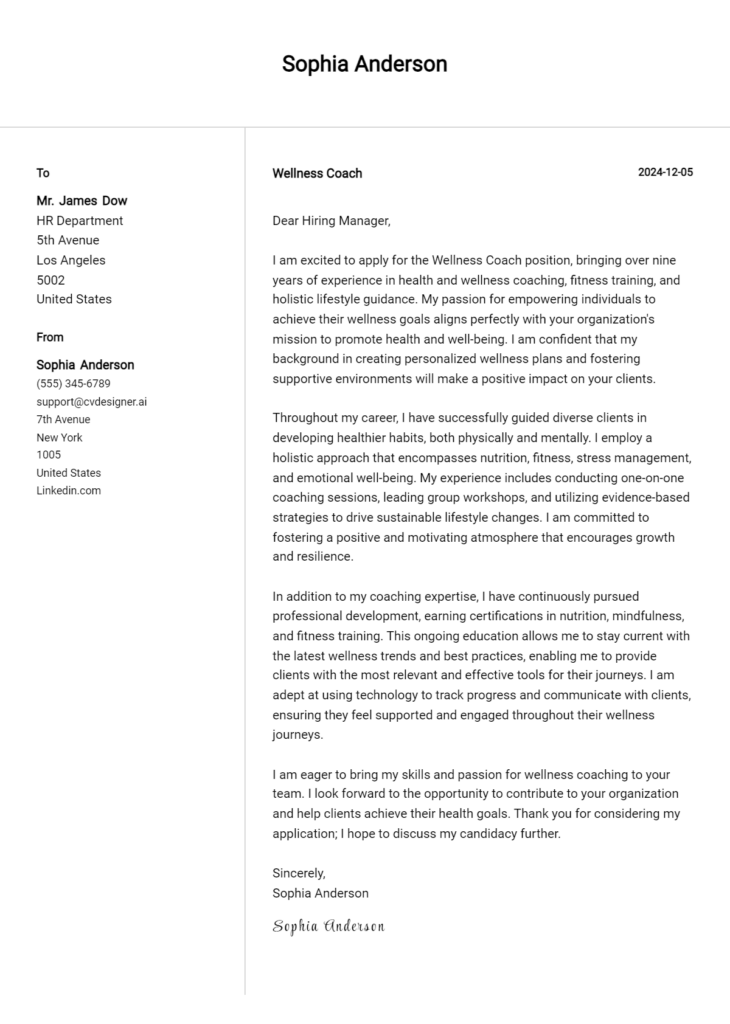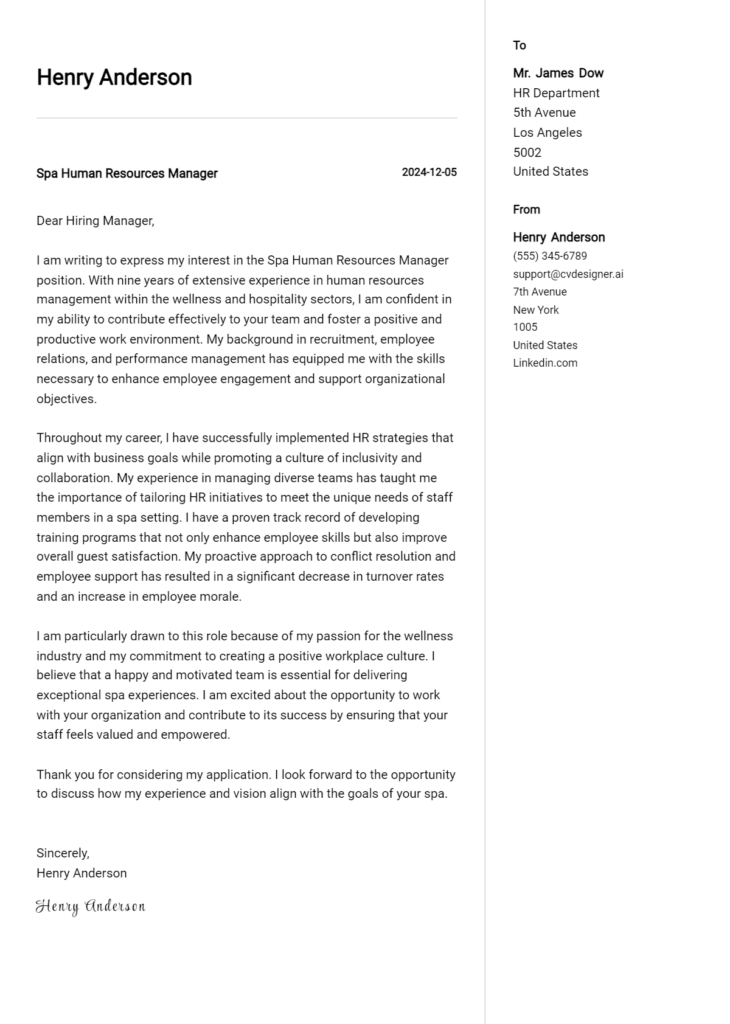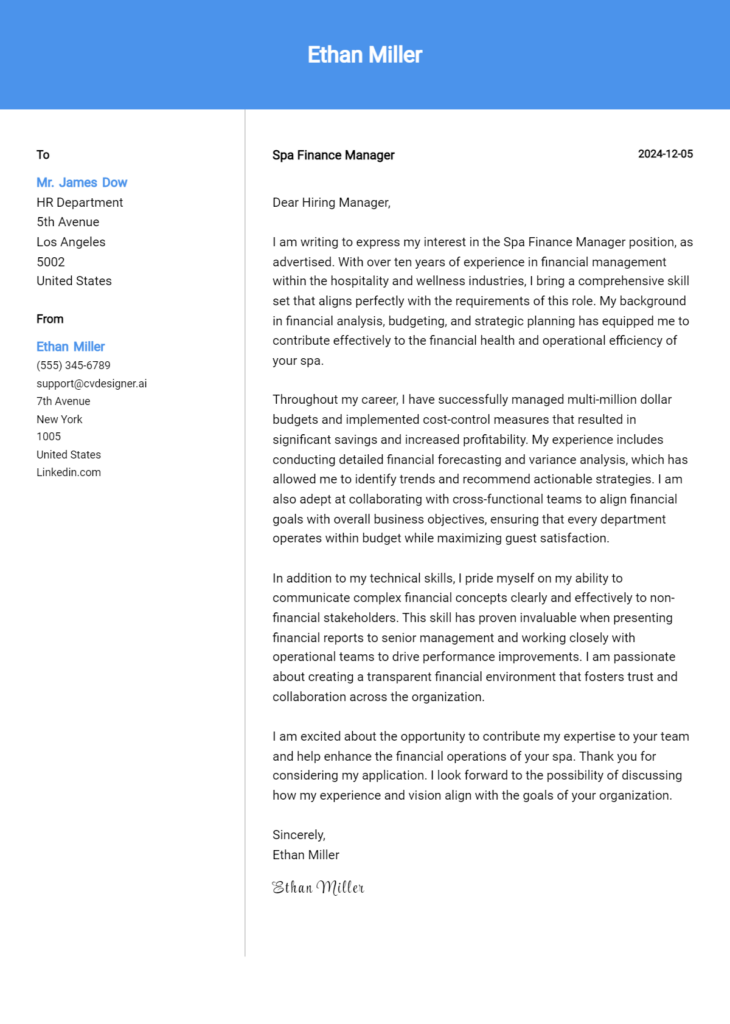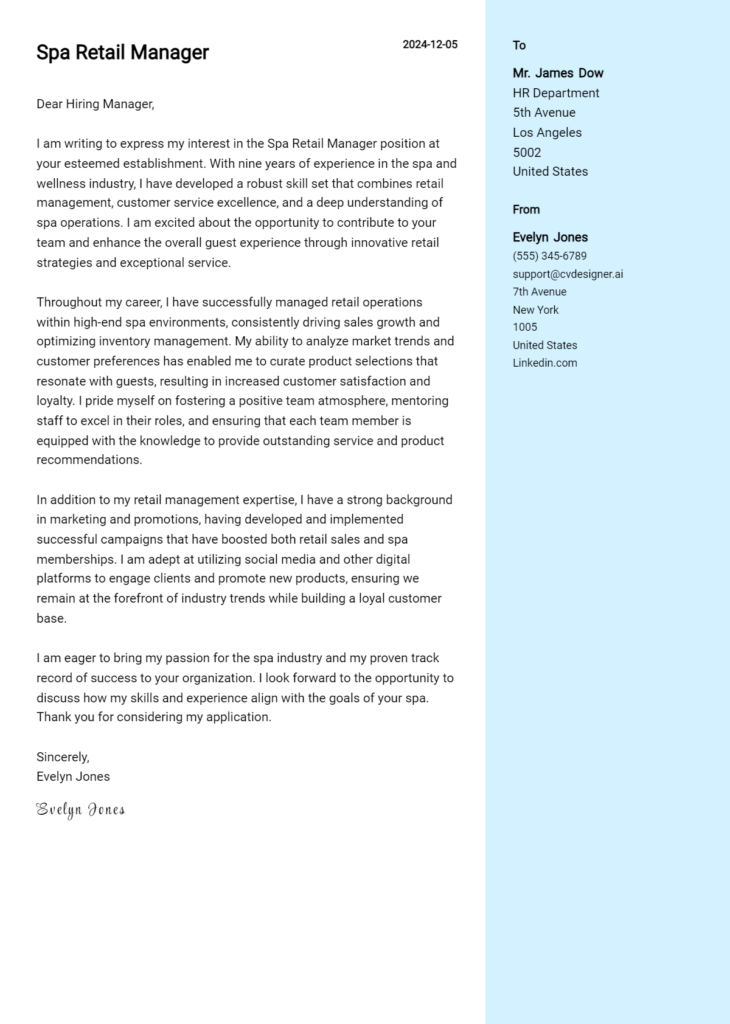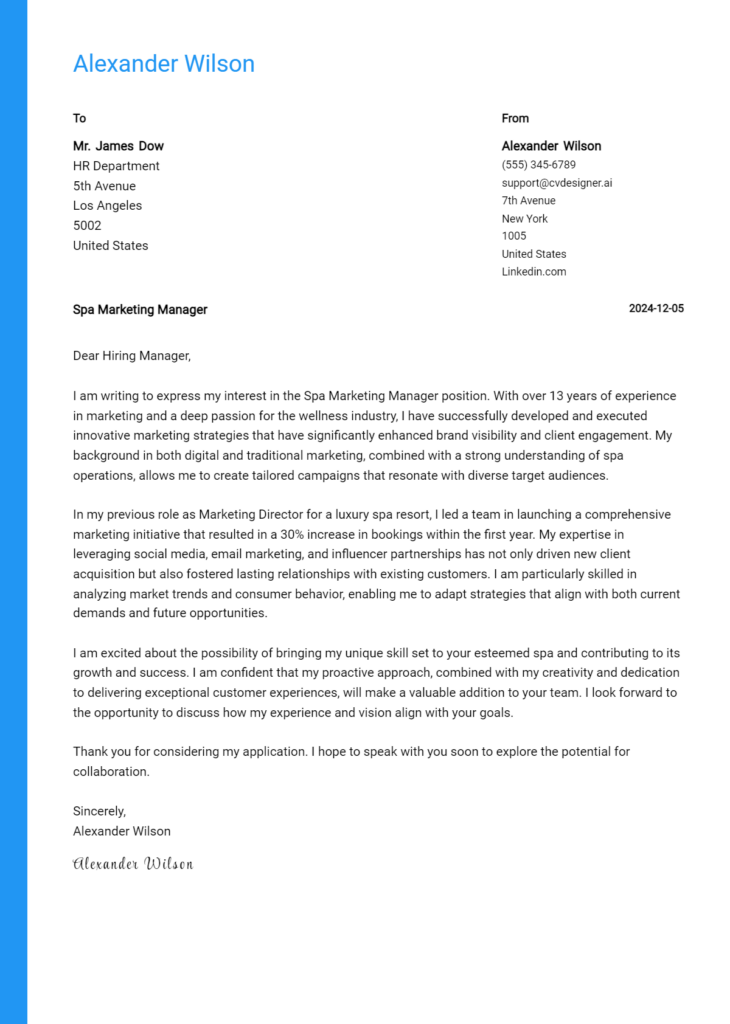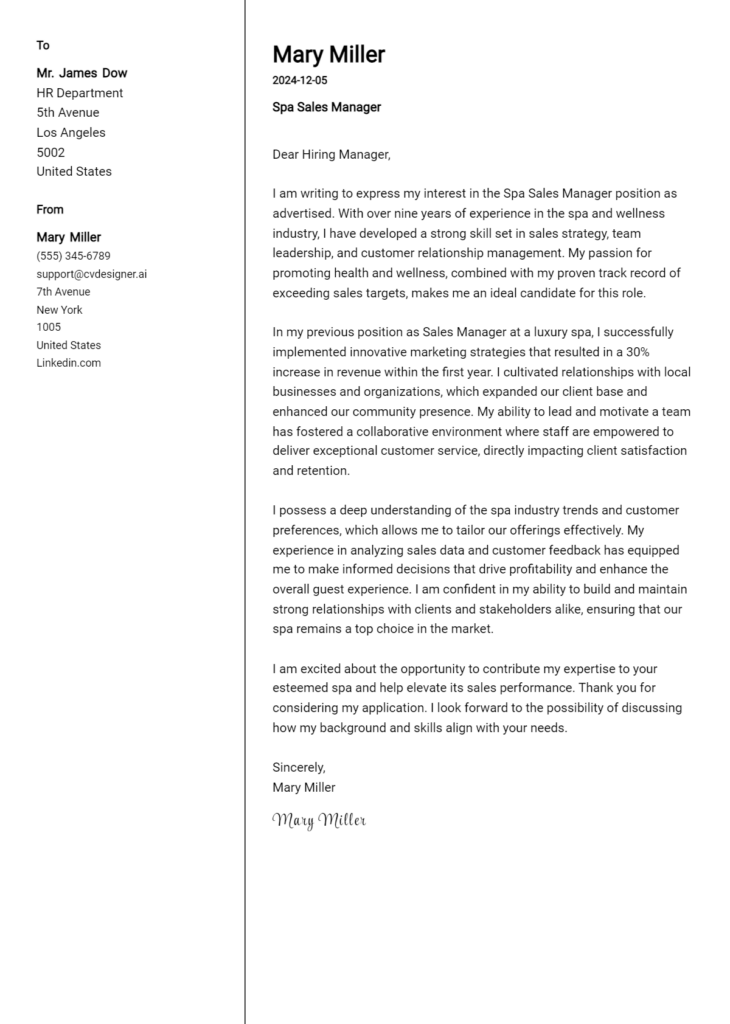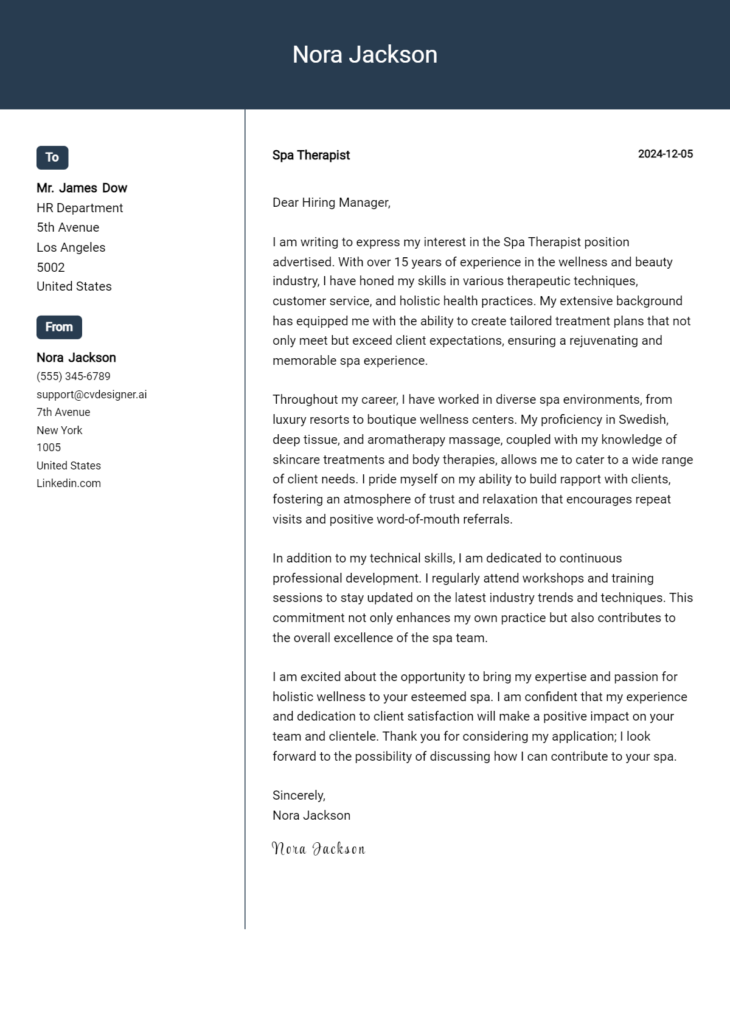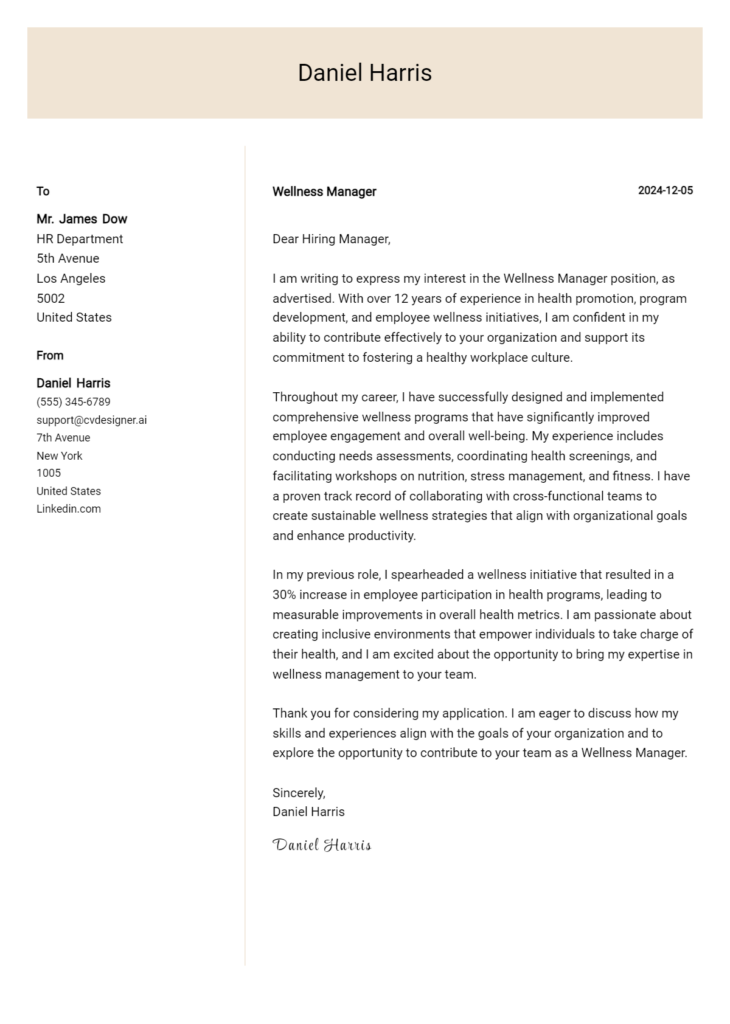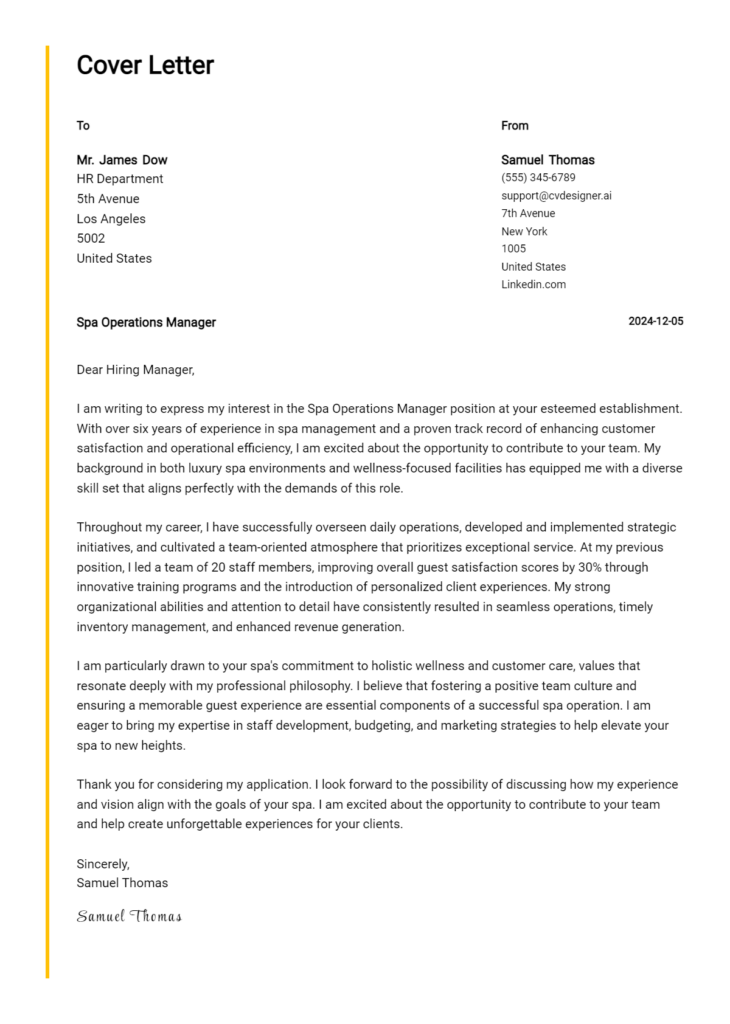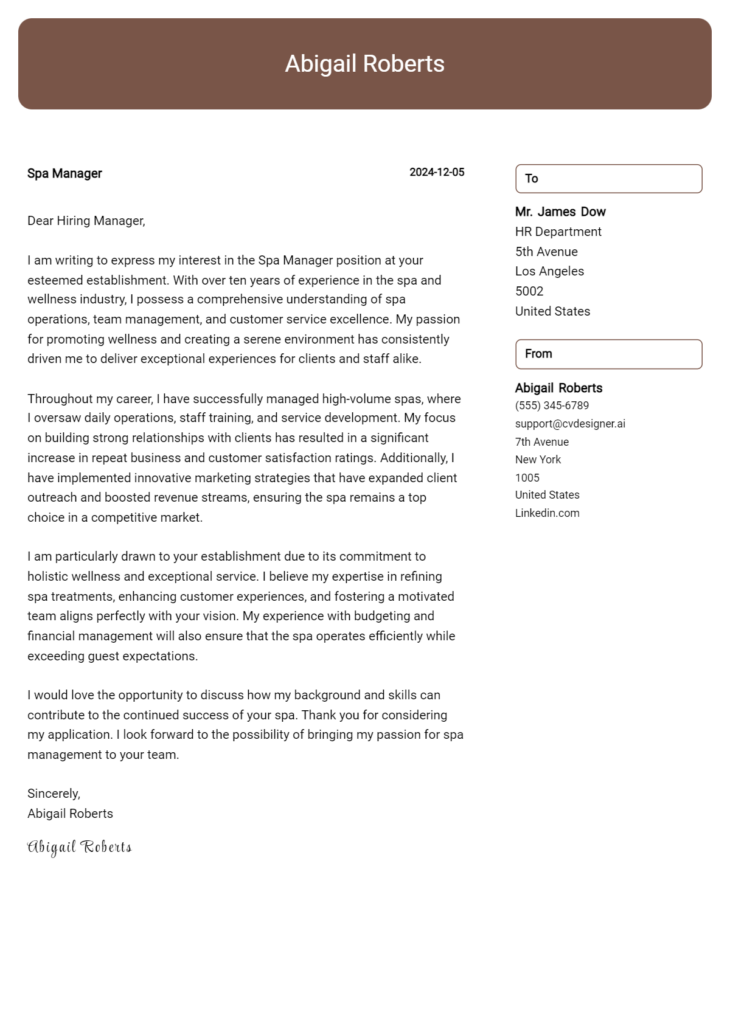Wellness Research Analyst Cover Letter Examples
Explore additional Wellness Research Analyst cover letter samples and guides and see what works for your level of experience or role.
How to Format a Wellness Research Analyst Cover Letter
Crafting a compelling cover letter is essential for a Wellness Research Analyst, as it serves as your first opportunity to convey your analytical skills, research capabilities, and passion for health and wellness. The way you format your cover letter not only reflects your professionalism but also highlights your attention to detail—qualities that are paramount in this field. A well-structured cover letter captures the hiring manager's interest and provides a clear narrative of your qualifications, making it easier for them to envision you as a valuable addition to their team.
In this guide, we'll outline the critical components of a professional cover letter, offering insights and examples tailored for the wellness research industry.
We'll focus on the essential components of a professional cover letter, including:
- Cover Letter Header
- Cover Letter Greeting
- Cover Letter Introduction
- Cover Letter Body
- Cover Letter Closing
Each section plays a vital role in showcasing your expertise and commitment to wellness research. Let’s delve into the specific elements that can make your cover letter stand out.
The Importance of a Cover Letter Header for a Wellness Research Analyst
A well-organized cover letter header is crucial for establishing a professional tone and providing essential information at a glance. For a Wellness Research Analyst position, the header should clearly present your contact information, the date, and the recipient's details, ensuring that employers can easily reach you and understand the context of your application. Clarity in your header reflects your attention to detail and professionalism—qualities that are particularly valuable in research roles. A strong header not only enhances the overall presentation of your cover letter but also creates a positive first impression.
Strong Example
Jane Doe 123 Wellness Way Health City, CA 90210 (555) 123-4567 jane.doe@email.com October 1, 2023 Dr. John Smith Hiring Manager Wellness Research Institute 456 Health St. Health City, CA 90211
Weak Example
jane doe health city, ca 555-123-4567 october 1, 2023 wellness research institute
The Importance of a Thoughtful Cover Letter Greeting
The greeting of your cover letter serves as the initial point of contact with the hiring manager and plays a crucial role in setting the tone for the rest of the letter. A well-crafted greeting not only demonstrates your professionalism but also adds a personal touch, making it more likely that your application will stand out. By addressing the hiring manager directly, you show that you've taken the time to research the company and its employees, which reflects your genuine interest in the role of Wellness Research Analyst. To ensure your greeting is impactful, avoid generic salutations such as "To Whom It May Concern." Instead, make an effort to find the name of the hiring manager or the relevant person in the department. If that information is not available, consider using a more general yet respectful greeting that still conveys warmth.
Strong Greeting Example
Dear [Hiring Manager's Name],
Weak Greeting Example
To Whom It May Concern,
Importance of a Well-Crafted Cover Letter Introduction for a Wellness Research Analyst
A well-crafted cover letter introduction is crucial for a Wellness Research Analyst position as it serves as the first impression to the hiring manager. This opening paragraph should be engaging enough to capture attention, while also clearly expressing the candidate's enthusiasm for the role. Moreover, it should briefly highlight key skills or achievements that align with the job requirements, making the candidate stand out. A strong introduction sets the tone for the rest of the cover letter, demonstrating professionalism and a genuine interest in contributing to the organization’s wellness initiatives. Below are examples of both effective and ineffective introductions.
Strong Example
Dear Hiring Manager, I am excited to apply for the Wellness Research Analyst position at [Company Name], where I can leverage my extensive background in health research and data analysis to contribute to your innovative wellness programs. With a Master's degree in Public Health and over five years of experience in conducting comprehensive health studies, I have a proven track record of translating complex data into actionable insights that drive program development and improve community health outcomes. I am passionate about promoting wellness and am eager to bring my analytical skills and dedication to your team.
Weak Example
To Whom It May Concern, I am writing to apply for the Wellness Research Analyst position because I need a job. I have some experience in research and I hope that I can help your company with its projects. My background in health studies might be useful, but I'm not sure. I look forward to hearing back from you.
Purpose of the Cover Letter Body for a Wellness Research Analyst
The body of the cover letter for a Wellness Research Analyst serves as a critical platform for candidates to articulate their relevant skills, experiences, and the unique value they bring to the company. This section allows applicants to highlight specific projects or accomplishments that demonstrate their analytical capabilities, understanding of wellness trends, and ability to contribute to innovative research initiatives. By providing concrete examples of past work, such as successful research studies, data analysis projects, or contributions to wellness programs, candidates can effectively convey their expertise and alignment with the company's mission and goals.
Strong Example
Dear Hiring Manager, I am excited to apply for the Wellness Research Analyst position at [Company Name]. With over five years of experience in health and wellness research, I successfully led a team project that analyzed the impact of workplace wellness programs on employee productivity, resulting in a 20% increase in engagement metrics for participating companies. My proficiency in statistical analysis and data visualization allowed me to present findings at the National Wellness Conference, where I received positive feedback and interest from several stakeholders. I believe that my background in developing evidence-based wellness strategies aligns well with [Company Name]'s commitment to promoting holistic health solutions. Sincerely, [Your Name]
Weak Example
Dear Hiring Manager, I am applying for the Wellness Research Analyst position. I have done some research on wellness and health topics. In my last job, I worked on a project, but it wasn't very successful. I am interested in wellness and think I could help your company. I have skills in data analysis and enjoy working with numbers. Best, [Your Name]
Importance of the Cover Letter Closing for a Wellness Research Analyst
The closing paragraph of a cover letter is crucial as it serves to summarize your qualifications, reiterate your enthusiasm for the role, and encourage the hiring manager to take the next step—whether that’s reviewing your resume or scheduling an interview. A strong closing leaves a lasting impression and reinforces your fit for the position, while a weak closing can diminish the impact of your entire application.
Strong Example
Thank you for considering my application for the Wellness Research Analyst position. With a strong background in health data analysis and a passion for promoting well-being, I am excited about the opportunity to contribute to your team. I believe my skills in statistical modeling and experience in wellness program evaluation align perfectly with your needs. I look forward to the possibility of discussing how my background and ideas can support your initiatives. Please feel free to review my resume for more details, and I hope to hear from you soon to schedule an interview.
Weak Example
Thanks for reading my letter. I think I’d be okay at the Wellness Research Analyst job. If you want to look at my resume, it’s attached. Maybe we can meet sometime if you’re interested.
These tips will assist candidates in crafting an effective cover letter for a Wellness Research Analyst position, emphasizing the importance of showcasing technical skills, problem-solving abilities, knowledge of the Software Development Life Cycle (SDLC), teamwork, and a passion for continuous learning. A well-structured cover letter can make a significant difference in grabbing the attention of hiring managers and setting oneself apart in a competitive job market.
Tips for Writing a Cover Letter for Wellness Research Analyst
Highlight Technical Skills: Clearly outline your relevant technical skills in your cover letter. Detail your experience with data analysis tools, statistical software, and programming languages that are pertinent to wellness research. Mention specific projects where you effectively utilized these skills to drive insights or improve processes. This not only demonstrates your qualifications but also shows your capability to handle the technical demands of the role.
Showcase Problem-Solving Abilities: Use your cover letter to provide examples of how you’ve successfully solved problems in previous roles. Describe a challenging situation you faced in research or data analysis and the steps you took to overcome it. Highlight the outcome, emphasizing how your analytical thinking contributed to a positive result. This narrative will illustrate your proactive approach and critical thinking skills.
Demonstrate Knowledge of SDLC: If applicable, leverage your knowledge of the Software Development Life Cycle in your cover letter. Explain how your understanding of SDLC processes has enhanced your ability to collaborate with software development teams or improved project outcomes in research initiatives. This shows potential employers that you are not only focused on research but also understand the broader context of how your work fits into larger projects.
Emphasize Teamwork and Collaboration: Wellness research often involves collaboration with interdisciplinary teams. Highlight your experience working in collaborative environments, whether in academics or professional settings. Provide specific examples of how you contributed to team projects, facilitated discussions, or helped drive consensus around research goals. This will demonstrate your ability to work well with others and your commitment to achieving shared objectives.
Convey a Passion for Continuous Learning: In a rapidly evolving field like wellness research, a commitment to continuous learning is essential. Use your cover letter to discuss how you keep up with industry trends, pursue professional development opportunities, or engage in ongoing education. Mention any relevant certifications or courses you’ve completed, which showcases your dedication to growth and adaptability.
By incorporating these tips into your cover letter, you can effectively position yourself as a strong candidate for the Wellness Research Analyst role. For additional guidance, consider using cover letter templates or a cover letter builder to help streamline the writing process and ensure your cover letter stands out.
Common Mistakes to Avoid in a Wellness Research Analyst Cover Letter
Crafting a compelling cover letter is essential for securing a position as a Wellness Research Analyst. Avoiding common mistakes can significantly enhance your chances of making a positive impression. Here are some pitfalls to watch out for and tips on how to steer clear of them:
Generic Greeting: Using a generic salutation like "To Whom It May Concern" can make your cover letter feel impersonal. Always try to address it to a specific hiring manager. If that information is not available, a simple "Dear Hiring Team" is preferable.
Lack of Specificity: Failing to mention specific skills or experiences related to wellness research can weaken your application. Tailor your content to highlight relevant accomplishments and how they align with the job description.
Ignoring the Company Culture: Not showcasing an understanding of the company's mission or values can be a missed opportunity. Research the organization and incorporate how your personal values align with theirs.
Overly Formal Language: Using overly complicated language can alienate the reader. Aim for a professional yet conversational tone that reflects your personality.
Repetition of the Resume: Simply reiterating what is on your resume is redundant. Use the cover letter to provide context and elaborate on key experiences that demonstrate your qualifications.
Neglecting to Proofread: Spelling and grammatical errors can undermine your professionalism. Always proofread your cover letter or ask someone else to review it before submission.
Poor Formatting: A cluttered or unprofessional format can detract from your message. Follow a clean and organized cover letter format to enhance readability.
By avoiding these common mistakes and focusing on creating a well-structured and tailored cover letter, you will be well on your way to making a strong impression. For inspiration, check out some cover letter examples that can guide you in crafting your own.
Cover Letter FAQs for Wellness Research Analyst
What should I include in my cover letter for a Wellness Research Analyst position?
In your cover letter, you should start with a strong introduction that outlines your enthusiasm for the position and the organization. Detail your relevant educational background, such as degrees in public health, nutrition, or related fields. Highlight any specific experience in wellness research, data analysis, or program evaluation. It's also beneficial to include examples of projects you've worked on that demonstrate your analytical skills and ability to translate data into actionable insights. Additionally, express your understanding of current wellness trends and how they align with the company’s goals. Conclude with a strong closing statement that reiterates your interest and invites further discussion.
How can I tailor my cover letter for a specific wellness research position?
To tailor your cover letter, start by thoroughly researching the organization and the specific role. Identify key responsibilities and required skills listed in the job description. Use this information to highlight your relevant experiences and skills that match those criteria. For instance, if the job emphasizes qualitative research methods, mention your experience in conducting interviews or focus groups. Incorporate specific terminology and phrases from the job posting to demonstrate your alignment with the organization's mission and values. Personalizing your cover letter shows that you have taken the time to understand the role and are genuinely interested in contributing to the team.
How can I demonstrate my passion for wellness in my cover letter?
To demonstrate your passion for wellness, share personal anecdotes or experiences that inspired your interest in this field. For example, you might discuss a project or initiative you spearheaded that focused on improving community health or your involvement in wellness programs. Mention any certifications, workshops, or relevant volunteer work that reflect your commitment to promoting wellness. Additionally, express your enthusiasm for current trends and research in wellness, such as mental health awareness or nutritional science. Your genuine interest will shine through when you connect your personal journey to your professional aspirations in the wellness sector.
What common mistakes should I avoid in my cover letter?
Common mistakes to avoid include using a generic template that doesn’t address the specific job or organization. Failing to proofread for typos and grammatical errors can also damage your credibility. Be cautious about being overly verbose; aim for clarity and conciseness to maintain the reader's attention. Avoid using jargon or overly technical language that might not resonate with all readers. Additionally, don't focus solely on your qualifications without connecting them to the organization’s goals or mission. Lastly, ensure that your closing statement is strong and inviting, encouraging the employer to reach out for further discussions.
Build your Cover Letter in minutes
Use an AI-powered cover letter builder and have your letter done in 5 minutes. Just select your template and our software will guide you through the process.

